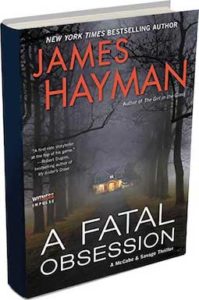“Hey, it’s fiction. Who cares if it’s accurate?”
Saturday, October 29th, 2011The summer before last I attended an International Thriller Writers get together at the Grand Hyatt Hotel in Manhattan. One of the better-attended sessions over the three days of the conference was an interview and discussion with Harlan Coben, whose books regularly hit the best seller lists and one of which, Tell No One, was made into a successful French movie starring a British actress, Kristin Scott Thomas (who speaks pretty good French) complete with subtitles. (Yes, I know Coben’s books usually take place in New Jersey. This movie was definitely French.)
Anyway, I digress. At the conference, one member of the audience asked Coben how much research he does when writing his books.
“None,” replied Coben.
“Then how do you know if what you are writing is accurate?”
“I don’t,” Coben said. “My books are fiction. I don’t pretend that they’re anything else. I don’t really care if they’re accurate or not. All I care about is whether people enjoy reading them.”
I remember the exchange so clearly because at the time I found it troubling.
Unlike Coben, I spend a fair amount of time and go to some lengths to assure the technical accuracy of what I write about.
My first novel The Cutting is typical. The Cutting is a story about illegal heart transplants. Before I wrote a single word for the book about transplant procedures, I read at least a dozen articles and watched a number of videos that describe and show the operation in detail. I talked to three cardiac surgeons about how one goes about removing a heart from one human body and then implanting it in another. I researched the instruments and tools required for the job, learning among other things how heart-lung machines work and the brand name of the saw most typically used to cut through the sternum and open the rib cage to get at the heart (Stryker, in case anyone is interested).
I also spent several hours with the transplant co-ordinator at Maine Medical Center discussing where hearts come from, who co-ordinates the process and who would be eligible or ineligible for such a procedure. Before publication, I sent my (almost) final manuscript to an old friend and college classmate who was and is a transplant surgeon at the Iowa Heart Center in Des Moines for a final fact check. He said I got almost everything right but suggested a few small changes, which I made.
All in all, at least a hundred hours and maybe more went into this research.
Was it really necessary for a reader’s enjoyment of the story? Probably not. Could the time have been better spent writing and polishing the manuscript? Possibly. Undoubtedly, most of my readers probably wouldn’t have known the difference if I’d fudged it. And for those few who happen to be cardiac surgeons and would recognize an inaccuracy, I can always adopt Coben’s retort. “Hey, it’s fiction. Who cares if it’s accurate?”
Harlan Coben has published a dozen or more successful books. I’ve published two, neither even remotely successful as most of his. Coben’s been number one on the New York Times best-seller list. I haven’t gotten anywhere close to that lofty status.
Still, as I close in on the finish of my third novel, Darkness First, I find myself spending more time than I probably should researching exactly how much of what drug a murderer should put in his tranquilizer dart to make sure the victim’s vicious rottweiler goes to sleep and stays asleep until the murderous deed is done.
Maybe Coben’s right. Maybe this kind of obsessiveness about accuracy isn’t necessary. Somehow I just like it better that way.

